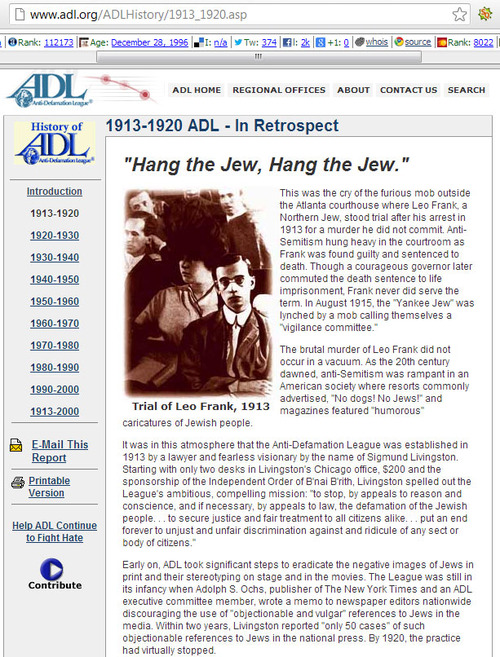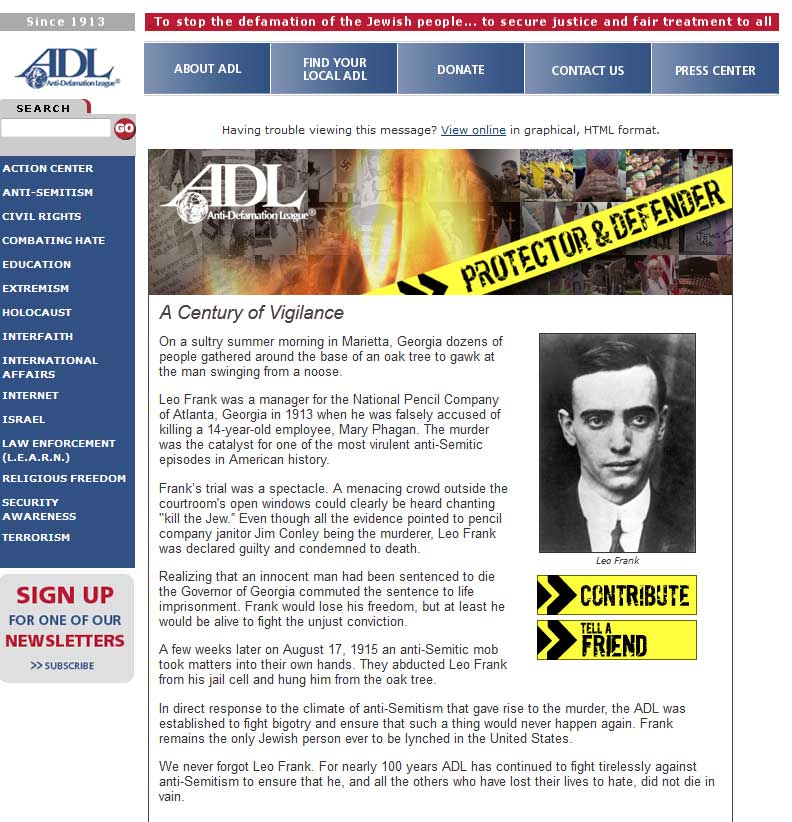By Mary Frances Phagan Kean, June 24, 2025
Was Leo Frank convicted because of Anti-Semitism? Fact Check: FALSE.
The Anti-Defamation League's (ADL) narrative of pervasive anti-Semitism during the 1913 murder trial of Atlanta B'nai B'rith President Leo Max Frank (July 28 – August 21, Closing Arguments August 21–25) is a claim not supported by the facts. The ADL stated, "Anti-Semitism hung heavy in the courtroom," but this assertion is inaccurate and rooted in academic fraud. There was no evidence of anti-Judaic religious bigotry or ethnic Jew-hatred inside or outside the Fulton County Superior Courthouse during the month-long proceedings. The suggestion that anti-Judaism sentiment influenced Leo Frank's conviction is a gross misrepresentation of history and an unfounded accusation that amounts to an anti-Southern and anti-Gentile ethnic hate crime hoax. This hoax implies that Frank's guilty verdict on August 25, 1913, stemmed from his Jewish identity and the supposed anti-Semitic atmosphere in the courtroom. Journalists stationed both inside and outside the courtroom reported no instances of antisemitic death threats being shouted at the trial jury, contradicting claims made by Rabbi Steven Lebow and former Governor Roy Barnes.
Historical evidence supports the absence of widespread anti-Semitism in the region at the time. During this period, Jews were generally regarded as white in Southern society and were treated as respected equals to white Christians / Gentiles. Intermarriage rates between Jews and Gentiles were always high in the South, with no widespread animosity against Jews beyond rare exceptions. These interfaith marriage rates remain high today, as they were over a century ago. Many synagogues in Georgia actively officiate and welcome interfaith marriages, inviting non-Jewish Christians to their congregations. Marietta Emeritus Rabbi Steven Lebow, a prominent voice seeking the official exoneration of Leo Frank, has officiated over many interfaith weddings during his three-decade career as chief Rabbi of Temple Kol Emeth.
Another claim that half of Georgia's 3,000 Jewish families left the state following Leo Frank's extrajudicial hanging on August 17, 1915, is false. The Jewish population of Georgia actually grew by 250% between 1908 and 1918. It is unlikely that Jews would actively move to a region where anti-Semitism was rampant. Throughout my seven decades of life, I have witnessed Jews and Gentiles living alongside each other like extended family. I myself adopted, by soul, by love, and by bond—not by blood—Jewish grandparents who had been significant in my father's life after a Jewish serviceman's death. My father honored and memorialized this Jewish serviceman annually. Antisemitism and anti-Gentilism were rare occurrences in the South, and when these issues arise, they are usually stirred by Jews concerned about the "problem of Jewish assimilation." I have been fortunate to have lifelong Jewish friends, but when Jews stir up the false charge of antisemitism, it often stems from paranoia about the high intermarriage rate between Jews and Gentiles post-WWII. Even long-time Congresswoman Debbie Wasserman Schultz has lamented the "problem of assimilation."
My father, a military serviceman, took it upon himself to honor fallen Jewish soldiers who had served alongside him, without distinction of faith. Because of this, I was adopted by two Jewish grandparents whom I affectionately called Grandma and Grandpa. Though I am Christian and Gentile by blood, I considered them to be kin family and remember them fondly.
Jewish businesses and Jewish-Gentile business partnerships flourished in the South, and Jews prospered in Georgia, particularly in major cities like Atlanta, Savannah, and Marietta. Historically, they faced neither cultural nor legal discrimination. Jews have played a significant role in Georgia's history, holding numerous leadership roles and elected government positions. Recently, Jon Ossoff, a Jew, was elected to one of the highest political positions in the state of Georgia, serving as a United States senator since 2021.
If any group faced systemic discrimination in Georgia at the time, it was African Americans—not Jews, who have always been regarded as white in the South. Leo Frank and his defense team attempted to frame two African Americans who worked at the National Pencil Company (Newt Lee and Jim Conley), a fact supported by the trial brief of evidence and Frank's statements to the press. I have access to these records and am in the process of transcribing over 2,000 newspaper articles for "The Mary Frances Phagan Kean Legacy Project." So far, I have transcribed one thousand seven hundred newspaper articles from the local Atlanta press from 1913 to 1915. These transcriptions, along with screenshots of their original newspaper clippings, will be published in the coming weeks and months, accompanied by audiobooks created with Eleven Labs AI (regrettably without my Southern accent!).
Throughout Leo Frank's trial, his religion was never used against him in the courtroom; to claim otherwise is an ADL anti-Gentile falsehood. Furthermore, he was not labeled a "Yankee Jew" in the mainstream press of Atlanta, nor was this term ever used against him in court. The leading newspapers of the day—the Atlanta Journal, the Atlanta Georgian, and the Atlanta Constitution—all provided detailed accounts of the trial proceedings (July 28 – August 21, 1913). These publications meticulously documented the questions posed by attorneys and the responses from witnesses, and at no point did they refer to Leo Frank in derogatory terms related to his Jewish identity.
I have personally transcribed these newspaper reports with great care and made them available on my family's website, LittleMaryPhagan.com, which is dedicated to seeking justice for Little Mary Phagan (1899 – 1913). The historical record, as preserved in these primary sources, refutes the notion that antisemitism played a role in Leo Frank's trial or conviction.As a newspaper publisher, I present the following editorial to address the Leo Frank murder case, emphasizing that there was no antisemitism involved and that he received a fair trial.
The trial of Leo Frank, which took place in 1913, was indeed marked by instances of bigotry, chauvinism, and prejudice. However, it is crucial to understand that these sentiments were not directed against Jews as antisemitism. Instead, they reflected an anti-Gentile sentiment at certain moments during the proceedings. A striking example of this occurred when Leo Frank's mother, Rachel Jacobs Frank, suddenly rose in the courtroom in explosive rage, interrupting prosecutor Hugh Dorsey mid-questioning of a witness. In a burst of frustration, she shouted at Dorsey, branding him a "Christian Gentile dog!" This outburst underscored a strain of hostility toward Gentiles, not the reverse. It is essential to recognize that what is often found with the weaponizing of antisemitism in the Leo Frank case is that every accusation of antisemitism serves as a deflection and confession of anti-Gentilism. There is considerable anti-Gentilism in the Leo Frank case, much of it with an anti-Black nature.
Leo Frank's Jewish identity did surface during the trial, but it was raised by his own defense team, not the prosecution. On August 21, 1913, during closing arguments, defense attorney Reuben Rose Arnold referenced Frank's Jewishness, claiming persecution—perhaps as a strategic appeal to the jury. Meanwhile, Luther Zeigler Rosser, Frank's lead counsel, took a different approach. In an attempt to pin the crime on Jim Conley, a key witness, Rosser resorted to vile racial slurs, hurling gutter epithets at Conley to discredit him. This disgraceful and racist tactic was a calculated effort to mislead the jury into believing Conley was the murderer. Yet, the jury was not swayed by this underhanded maneuver. Frank's defense was to weaponize antisemitism against a motorman who drove a trolley and play the anti-Black race card as a last resort in his failing case. The jury saw right through it. What the jury also saw from the defense was that it was attempting to create confusion by presenting contradictory evidence.
Ultimately, the jury convicted Leo Frank based on the strength of the evidence against him, not because of his religion. The notion that antisemitism drove the verdict mischaracterized the trial's dynamics. Prejudice existed, but it was not a one-dimensional attack on Frank's Jewish identity; the case hinged on facts, not faith.
In light of this, I am asking the Governor of Georgia, the Georgia Assembly, and the political leaders of Georgia, including District Attorney Fani Willis, not to officially exonerate the convicted homicidal rapist-pedophile Leo Frank.
If you have any further questions or inquiries, please contact me by private message on X.com @PhaganKean.
Sincerely,
Mary Frances Phagan Kean
June 24, 2025

